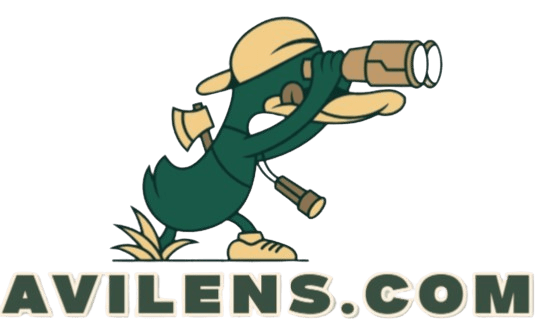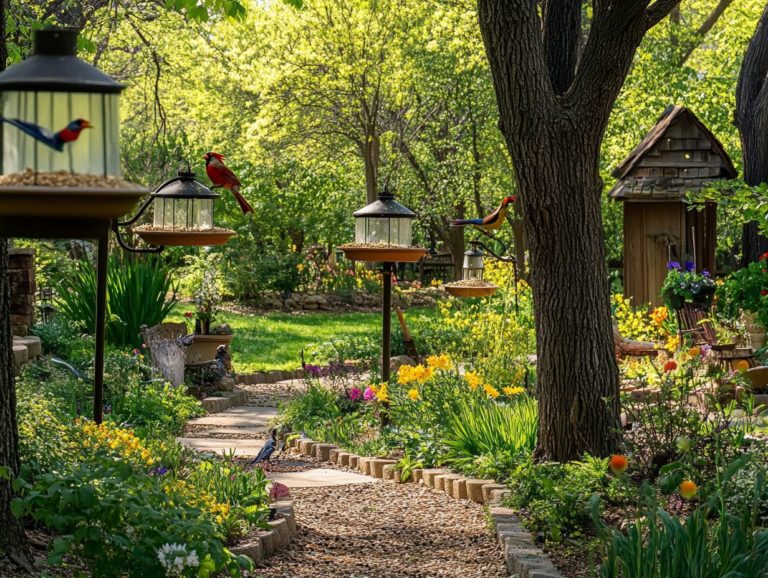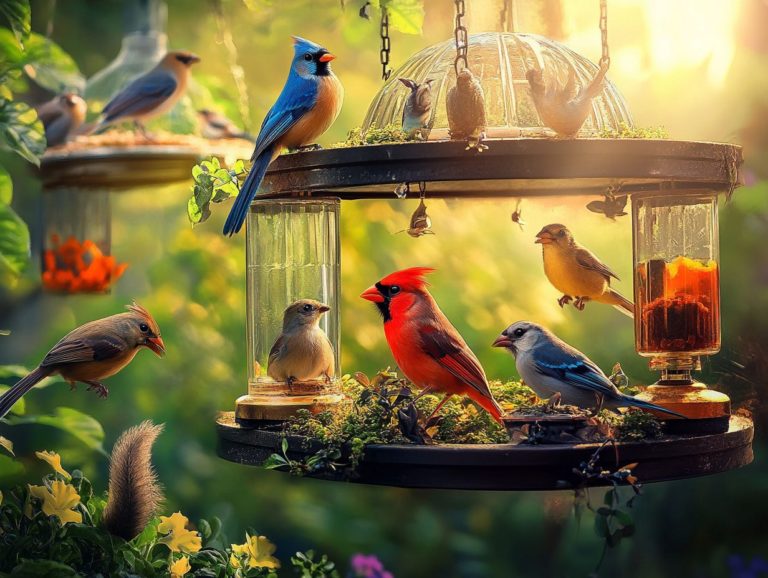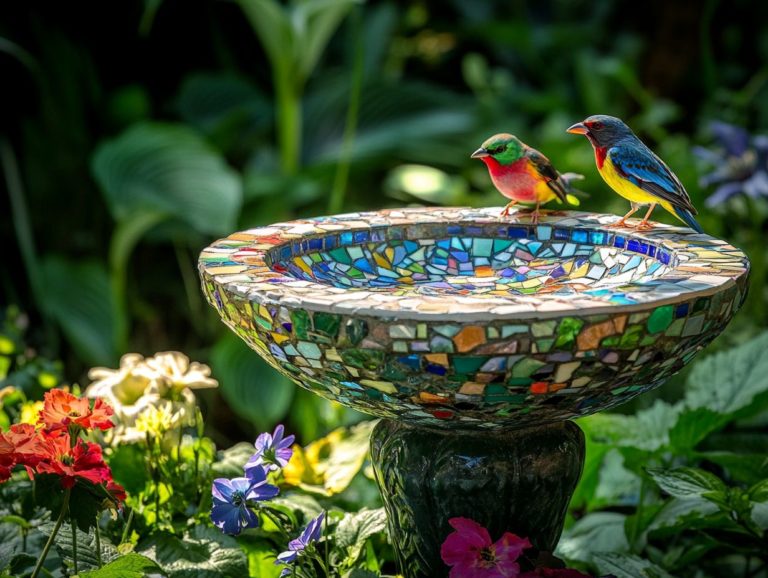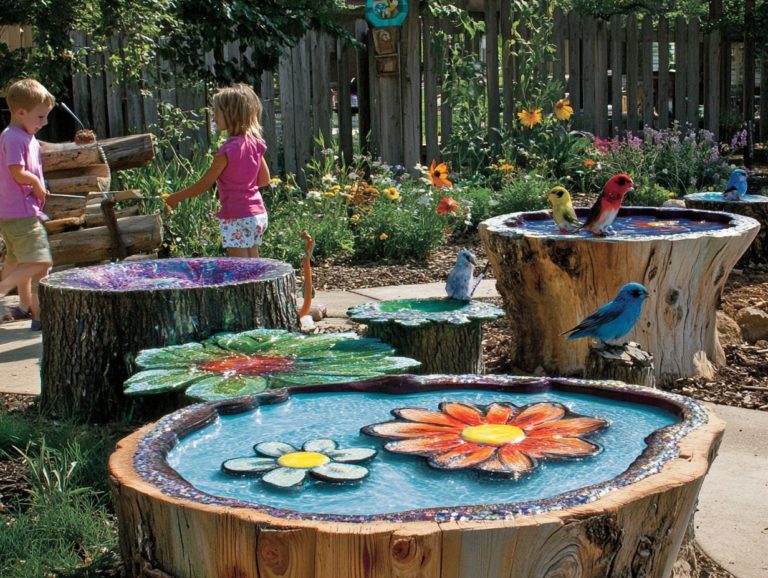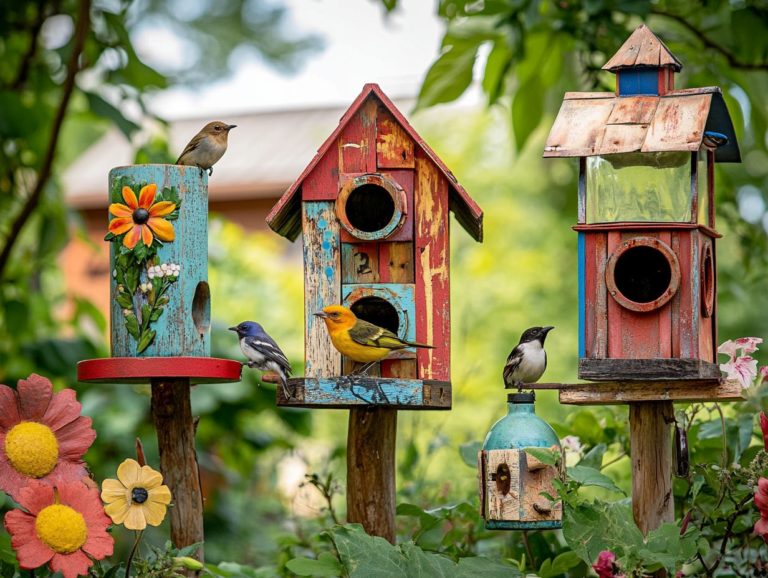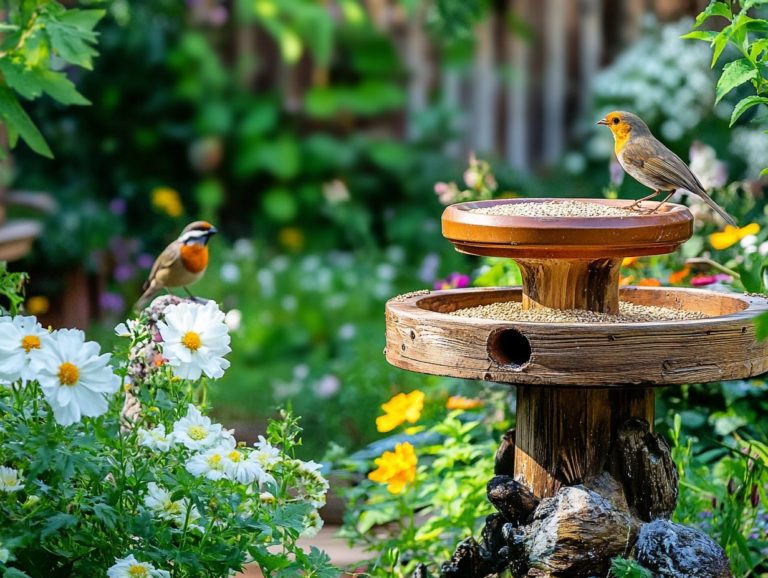Bird Feeding Laws: What You Need to Know
Bird feeding presents a wonderful opportunity to connect with nature. It’s thrilling to explore the regulations that help protect our feathered friends!
This guide delves into the intricacies of bird feeding laws. It details which species require protection and the permits that may be necessary.
It also outlines the potential repercussions of non-compliance. You can also learn how to become an advocate for bird feeding regulations in your community.
Immerse yourself in this captivating and significant topic!
Contents
- Key Takeaways:
- Understanding Bird Feeding Laws
- Types of Birds Covered by Laws
- Permits and Licenses for Bird Feeding
- Potential Consequences for Breaking Laws
- Best Practices for Feeding Birds
- Advocating for Bird Feeding Laws
- Frequently Asked Questions
- What are some common bird feeding laws that I should be aware of?
- Do I need a permit to feed birds in my backyard?
- Can I be fined for not following bird feeding laws?
- Are there any restrictions on the types of food I can use to feed birds?
- What should I do if I find an injured or sick bird at my feeder?
- Can I be held responsible for bird-related incidents caused by my feeder?
Key Takeaways:
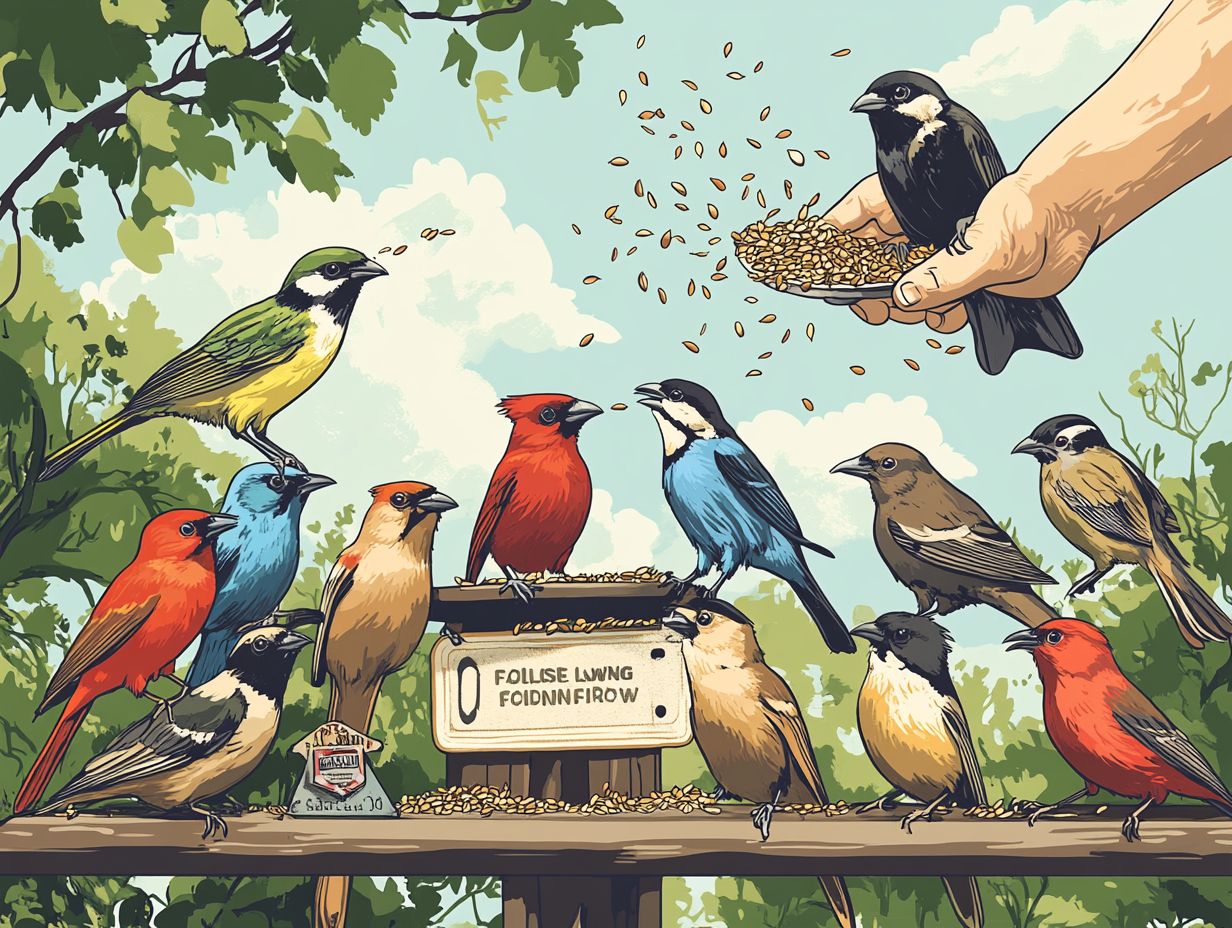
- It is important to understand and follow bird feeding laws to protect both birds and their habitats.
- Protected species and their habitats are covered by bird feeding laws, so it is important to be aware of which birds are protected in your area.
- Obtaining necessary permits and licenses and following best practices can help prevent fines and legal consequences for breaking bird feeding laws.
Understanding Bird Feeding Laws
Understanding bird feeding laws is essential for anyone involved in backyard bird feeding. For more insights on regulations and best practices, check out feeding birds: what you need to know, as regulations can differ significantly from one region to another.
These laws can have a profound impact on local wildlife, both positively and negatively. In the United States, such regulations are designed to protect a variety of bird species including songbirds, hummingbirds, and goldfinches.
They establish guidelines that promote ways to protect wildlife and responsible feeding practices. By adhering to these laws, you safeguard the well-being of the birds.
You also cultivate a harmonious relationship between birdwatchers, wildlife rehabilitators, and the surrounding community.
Overview of Regulations
The overview of bird feeding regulations presents essential guidelines designed to safeguard wildlife and promote the health of birds in your backyard.
These regulations detail acceptable food sources. They advise against items like bread and processed foods that can be detrimental to birds.
They emphasize the importance of using fresh seeds and maintaining clean bird feeders to reduce the risk of spreading avian diseases. These rules are part of a broader wildlife conservation initiative.
For you, adhering to these regulations enriches your birdwatching experience by nurturing healthier bird populations. It also bolsters conservation efforts, amplifying your enjoyment and focus as you observe diverse species in their natural habitats.
Types of Birds Covered by Laws
Bird feeding regulations encompass an array of protected bird species. They focus on the conservation of their habitats and bolstering their survival within local ecosystems.
This is especially crucial in backyard environments. Interactions with wildlife are prevalent and foster a deeper connection to nature.
Protected Species and Their Habitats
Protected species, such as songbirds and goldfinches, depend on specific habitats. These habitats are crucial for their survival and overall well-being.
These habitats are enriched with native plants that provide essential food sources and shelter. They also include clean water needed for drinking and bathing.
Without a thriving ecosystem filled with diverse flora, these birds face challenges in finding what they need to flourish. You can make a significant impact by supporting these vital habitats right in your own backyard.
By planting native flowers, creating bird-friendly spaces, and ensuring that clean water is readily available for local wildlife, you play an active role in this conservation effort. Embracing these practices allows you to contribute meaningfully to the protection of these species and the promotion of biodiversity within your community.
Permits and Licenses for Bird Feeding
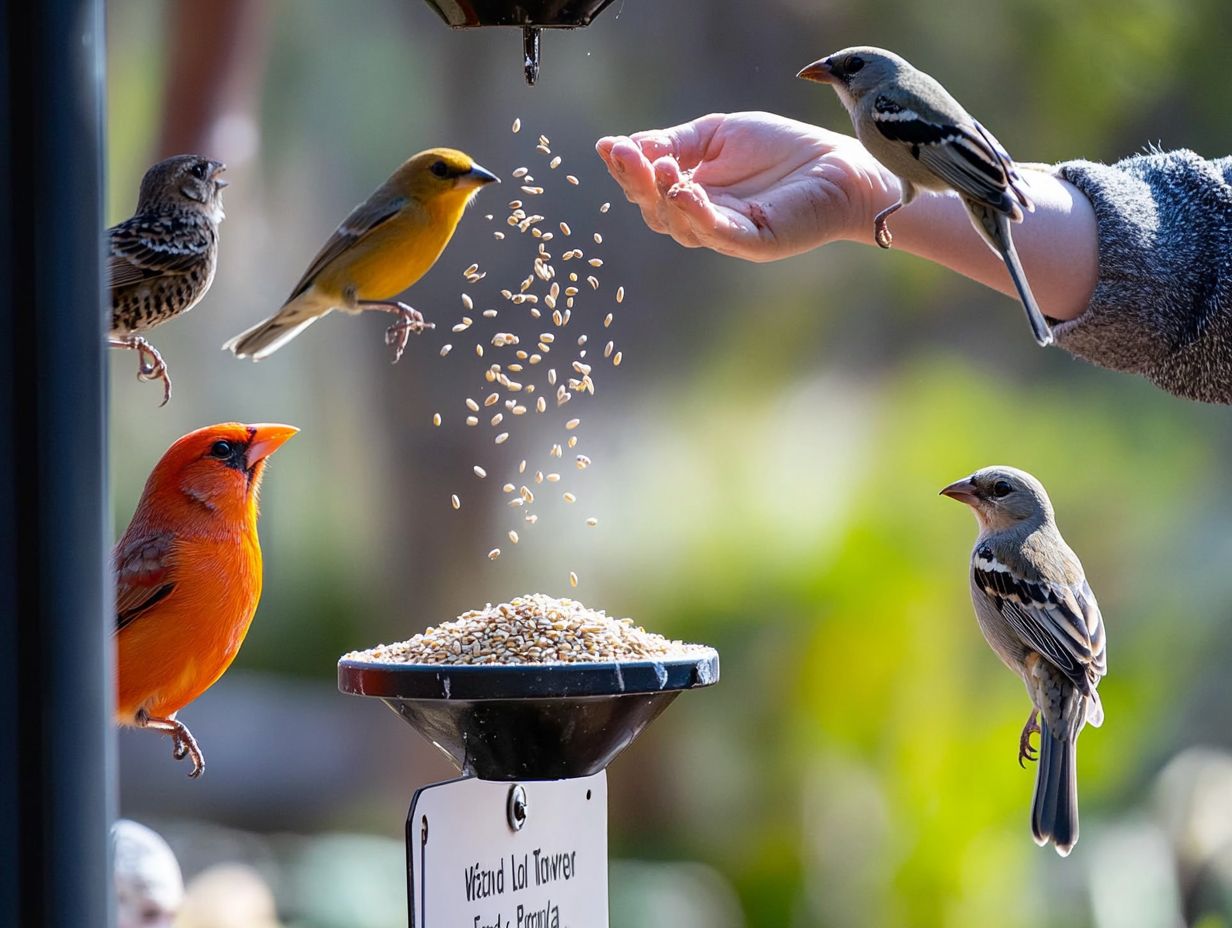
Securing the necessary permits and licenses for bird feeding is crucial for ensuring compliance with local wildlife conservation laws. This not only safeguards the environment but also elevates the effectiveness of your backyard bird feeding endeavors.
Don t wait ensure you secure your permits today to protect our avian friends!
When and How to Obtain Them
To obtain permits for bird feeding, familiarize yourself with the local legislation that outlines when and how these permits can be acquired.
This journey typically begins with researching regional guidelines, which are often conveniently available on local wildlife or conservation agency websites. Gather necessary documentation, such as your identification, proof of residence, and any prior records of bird feeding or wildlife interactions.
Once you have compiled the required documents, submit your application to the relevant local authority, which may be a wildlife conservation office or similar entity. The timeline for permit approval can vary, so ask about expected processing times.
By understanding and securing the right permits, you can enjoy enriching experiences while fostering a safe environment for birds and ensuring compliance with local wildlife laws.
Potential Consequences for Breaking Laws
Violating bird feeding laws can lead to serious consequences, including fines and penalties. These highlight the critical importance of adhering to regulations aimed at wildlife conservation and the well-being of avian populations.
These guidelines are not just unnecessary paperwork; they play a vital role in protecting our feathered friends and their habitats.
Fines, Penalties, and Legal Ramifications
Fines and penalties for violating bird feeding laws can vary significantly based on your jurisdiction and the severity of the infraction. This serves as a stark reminder of the legal consequences tied to irresponsible feeding practices.
In some municipalities, you may face fines exceeding $500 if you disregard regulations designed to prevent wildlife from becoming overly reliant on human-provided food sources. These measures aren t arbitrary; they aim to safeguard local ecosystems.
Legal repercussions can also include community service or mandatory educational courses on wildlife habitats. This highlights the gravity of these laws.
The impact of these penalties extends beyond financial implications. They elevate community awareness regarding responsible bird feeding and nurture a shared commitment to conservation efforts.
Strict enforcement protects avian species from starvation and encourages their natural foraging behaviors, ultimately enhancing biodiversity.
Best Practices for Feeding Birds
Implementing best practices for feeding birds supports local wildlife and enhances your birdwatching experience.
This approach fosters responsible feeding ethics and deepens your understanding of bird behavior, creating a more enriching connection with nature.
Tips for Feeding Birds Responsibly
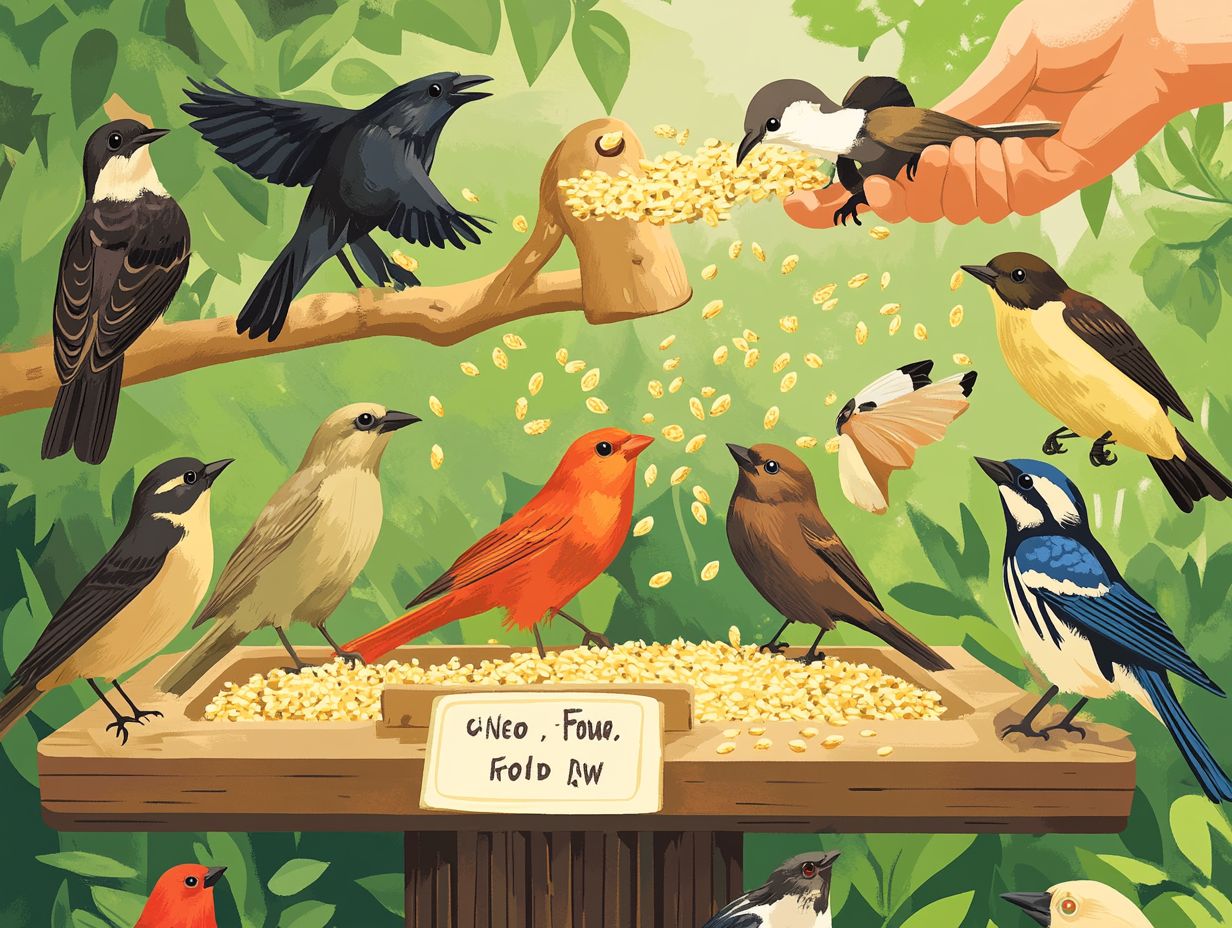
- Offer supplemental feeding options while ensuring predator safety.
- Minimize the risk of disease transmission among avian populations.
- Choose bird feeders specifically designed for the species you wish to attract.
- Avoid processed foods or bread; opt for natural seeds, nuts, and fruits.
- Regularly clean your feeders to prevent mold and bacteria buildup.
By implementing these responsible practices, you can revel in the beauty of nature while actively supporting the health of birds around you.
Advocating for Bird Feeding Laws
Advocating for bird feeding laws is crucial for promoting wildlife conservation, enhancing community engagement, and ensuring that local bird populations flourish in safe, nurturing environments.
By championing these laws, you contribute to a vibrant ecosystem while fostering a sense of responsibility and connection within your community, especially concerning deer feeding and other wildlife interactions.
How to Get Involved and Make a Difference
Engaging in bird conservation efforts and promoting better bird protection laws can truly transform local wildlife interactions and foster a healthier ecosystem.
You can make a real difference by supporting these initiatives in meaningful ways, such as volunteering with local wildlife organizations that focus on habitat preservation which means protecting the places where birds live. You’ll have the opportunity to roll up your sleeves and participate in hands-on restoration projects.
Joining birdwatching events not only deepens your appreciation for avian species but also helps gather valuable data on bird populations, making you an integral part of the conservation effort.
Advocate for stronger bird conservation measures through community meetings and local campaigns to influence policy decisions that safeguard these remarkable creatures. By sharing your knowledge and resources with neighbors and friends, you can spark a collective effort that highlights the essential role birds play in maintaining biodiversity.
Frequently Asked Questions
What are some common bird feeding laws that I should be aware of?
Some common bird feeding laws include not using certain types of feeders that can harm birds, such as mesh feeders, and avoiding feeders that are too close to a window or other potential hazards. For more information, check out what you should know about bird watching laws.
Do I need a permit to feed birds in my backyard?
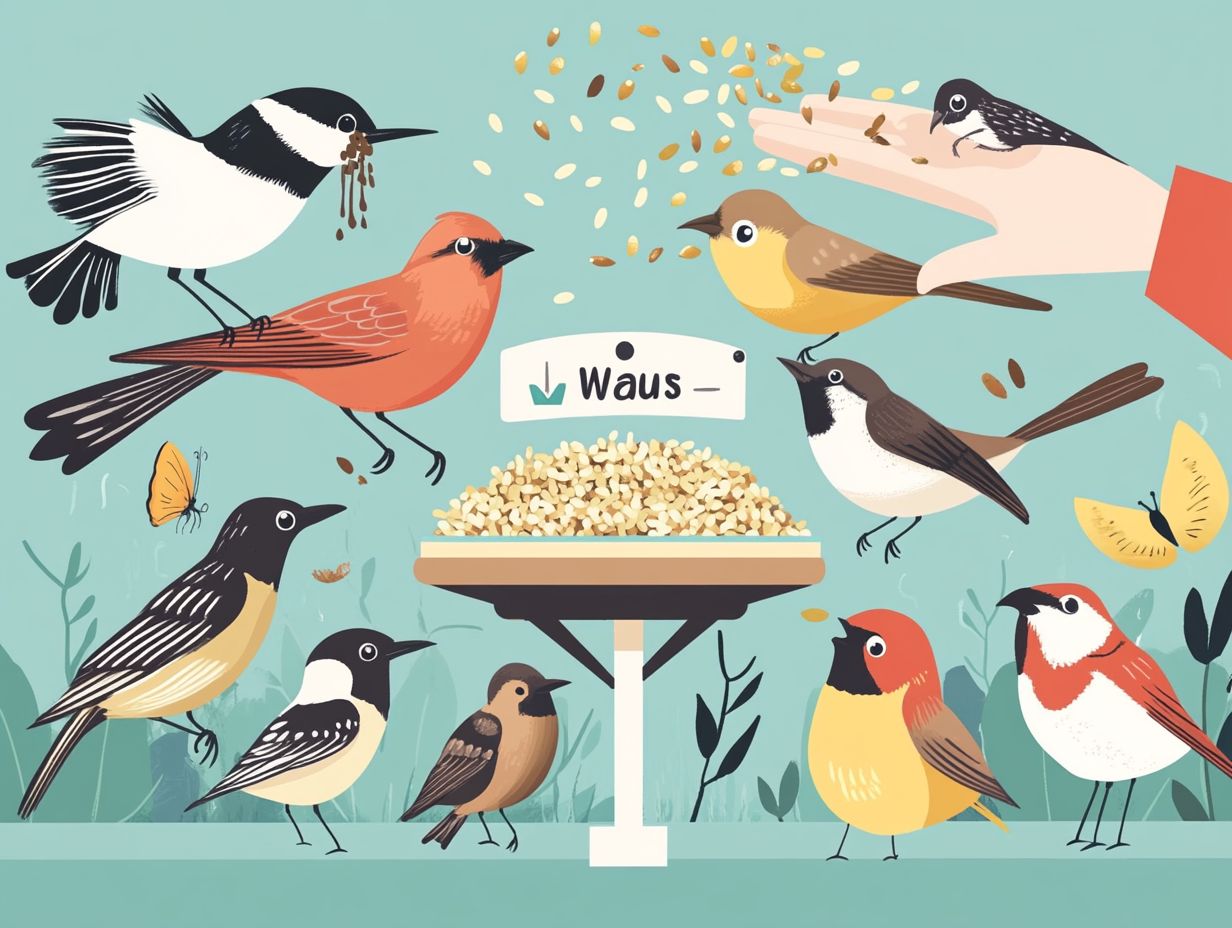
In most cases, you do not need a permit to feed birds in your backyard. However, if you live in an area protected for certain types of birds, such as migratory birds, you may need a permit to feed them.
Can I be fined for not following bird feeding laws?
Yes, you can be fined for not following bird feeding laws. The amount of the fine will vary depending on the specific law that was broken and your location.
Are there any restrictions on the types of food I can use to feed birds?
Yes, there are restrictions on the types of food you can use to feed birds. Foods that are toxic or harmful to birds, such as bread or salty foods, should not be used. It is best to stick to birdseed and suet, as these are safe and nutritious options for birds.
What should I do if I find an injured or sick bird at my feeder?
If you find an injured or sick bird at your feeder, it is important to contact a wildlife rehabilitator for assistance. Do not attempt to handle the bird yourself, as it may cause further harm.
As the feeder owner, it is important to take proper precautions to prevent bird-related incidents, such as placing the feeder in a safe location and using feeders that are not harmful to birds. If you neglect to take these precautions and an incident occurs, you may be held responsible.
Join us today in making a difference for our feathered friends!
